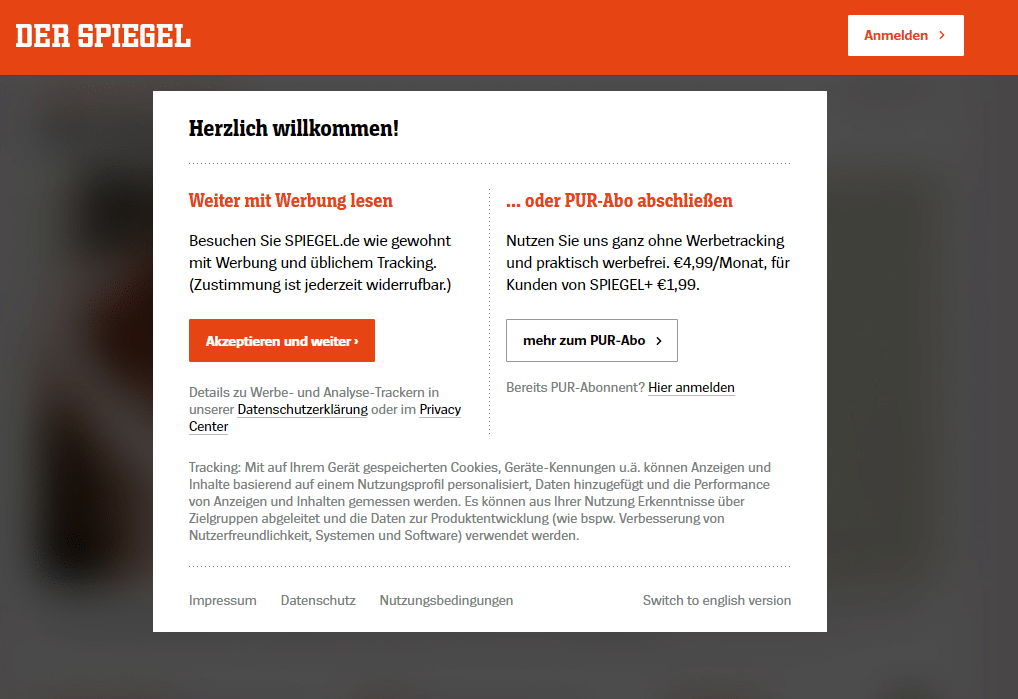Geoblocking Regulation: Apps and the like?
Does the geoblocking regulation I reported on here actually apply to apps and/or computer games? And if so, under what...
Read moreDetailsAfter the German data protection authorities published a guidance document last year, the Planet49 case should now be known to every website operator and numerous lawyers have also informed about the necessity of cookie banners, the data protection authorities have now announced that they want to separately monitor these cookie information solutions and also sanction inadequate use. Many cookie consent banners are designed in a questionable manner and may therefore be considered illegal.
This mainly concerns those solutions where the Accept button is much more clearly easier to click than the Reject button, or those where individual buttons can only be rejected individually. Also, many such banners are not exactly clear.
These include, for example, such solutions

Here the reject button is not present at all or only by pushing the “Necessary” button.
This solution is also unlikely to stand up to deeper scrutiny.

Rejecting cookies is not possible or only occurs if you use a paid subscription.
Some large media sites have no cookie banners at all, although services such as Doubleclick and Google Adsense are used.
Of course, when surfing the web, you also constantly see websites with mere notices that cookies would be used. In the vast majority of cases, these are not sufficient. The only exception would be (and even this is not uncontroversial) if really 100% only technically absolutely necessary cookies are set. This should rarely be the case and with Wordpress, due to the use of numerous plugins that save some presets, it is almost never feasible.
Even if it is likely that larger, high-reach providers will be investigated first in the first step, every provider should take care of a legally compliant implementation, not only with the coming TTDSG. Moreover, it cannot be ruled out that warning agents will jump on the current bandwagon.
Marian Härtel ist Rechtsanwalt und Fachanwalt für IT-Recht mit einer über 25-jährigen Erfahrung als Unternehmer und Berater in den Bereichen Games, E-Sport, Blockchain, SaaS und Künstliche Intelligenz. Seine Beratungsschwerpunkte umfassen neben dem IT-Recht insbesondere das Urheberrecht, Medienrecht sowie Wettbewerbsrecht. Er betreut schwerpunktmäßig Start-ups, Agenturen und Influencer, die er in strategischen Fragen, komplexen Vertragsangelegenheiten sowie bei Investitionsprojekten begleitet. Dabei zeichnet sich seine Beratung durch einen interdisziplinären Ansatz aus, der juristische Expertise und langjährige unternehmerische Erfahrung miteinander verbindet. Ziel seiner Tätigkeit ist stets, Mandanten praxisorientierte Lösungen anzubieten und rechtlich fundierte Unterstützung bei der Umsetzung innovativer Geschäftsmodelle zu gewährleisten.
Does the geoblocking regulation I reported on here actually apply to apps and/or computer games? And if so, under what...
Read moreDetailsBaFin will not object if payment service providers based in Germany execute card payments on the Internet until December 31,...
Read moreDetailsThe General Data Protection Regulation (GDPR) has fundamentally changed the way companies handle personal data. It has set new standards...
Read moreDetailsNot long ago, the topic of withholding tax on online advertising, such as Google Ads, was on everyone's lips. Also...
Read moreDetailsSkillgaming? I have just completed an expert opinion on the admissibility of Skillgaming under Section 284 of the German Criminal...
Read moreDetailsThe Munich Higher Regional Court clarified in its ruling of 31.07.2024 under file number 7 U 351/23 that forwarding work...
Read moreDetailsAs a contract lawyer, I deal with contract negotiations on a daily basis and have learned a lot in the...
Read moreDetailsBy popular demand over the past few weeks, I will once again be hosting a webinar or Q/A (so you...
Read moreDetailsAs a lawyer who represents many tournament organizers, esports players and esports teams, I realize that the issue of taxation...
Read moreDetailsWährend ich an meinem eigenen WordPress-Plugin code, taucht immer wieder eine Frage auf: Gehört mir diese Software wirklich? Im Alltagsverständnis...
Read moreDetailsIn dieser fesselnden Podcast-Episode tauch ich tief in die Welt der Blockchain-Technologie und Smart Contracts ein. Die 25-minütige Folge beleuchtet,...
Read moreDetailsIn diesem Video rede ich ein wenig über transparente Abrechnung und wie ich kommuniziere, was es kostet, wenn man mit...
Read moreDetails